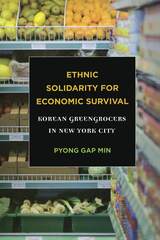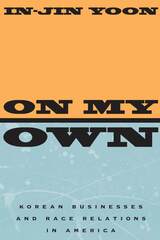2 books about Korean American businesspeople

Ethnic Solidarity for Economic Survival
Korean Greengrocers in New York City
Pyong Gap Min
Russell Sage Foundation, 2008
Generations of immigrants have relied on small family businesses in their pursuit of the American dream. This entrepreneurial tradition remains highly visible among Korean immigrants in New York City, who have carved out a thriving business niche for themselves operating many of the city's small grocery stores and produce markets. But this success has come at a price, leading to dramatic, highly publicized conflicts between Koreans and other ethnic groups. In Ethnic Solidarity for Economic Survival, Pyong Gap Min takes Korean produce retailers as a case study to explore how involvement in ethnic businesses—especially where it collides with the economic interests of other ethnic groups—powerfully shapes the social, cultural, and economic unity of immigrant groups. Korean produce merchants, caught between white distributors, black customers, Hispanic employees, and assertive labor unions, provide a unique opportunity to study the formation of group solidarity in the face of inter-group conflicts. Ethnic Solidarity for Economic Survival draws on census and survey data, interviews with community leaders and merchants, and a review of ethnic newspaper articles to trace the growth and evolution of Korean collective action in response to challenges produce merchants received from both white suppliers and black customers. When Korean produce merchants first attempted to gain a foothold in the city's economy, they encountered pervasive discrimination from white wholesale suppliers at Hunts Point Market in the Bronx. In response, Korean merchants formed the Korean Produce Association (KPA), a business organization that gradually evolved into a powerful engine for promoting Korean interests. The KPA used boycotts, pickets, and group purchasing to effect enduring improvements in supplier-merchant relations. Pyong Gap Min returns to the racially charged events surrounding black boycotts of Korean stores in the 1990s, which were fueled by frustration among African Americans at a perceived economic invasion of their neighborhoods. The Korean community responded with rallies, political negotiations, and publicity campaigns of their own. The disappearance of such disputes in recent years has been accompanied by a corresponding reduction in Korean collective action, suggesting that ethnic unity is not inevitable but rather emerges, often as a form of self-defense, under certain contentious conditions. Solidarity, Min argues, is situational. This important new book charts a novel course in immigrant research by demonstrating how business conflicts can give rise to demonstrations of group solidarity. Ethnic Solidarity for Economic Survival is at once a sophisticated empirical analysis and a riveting collection of stories—about immigration, race, work, and the American dream.
[more]

On My Own
Korean Businesses and Race Relations in America
In-Jin Yoon
University of Chicago Press, 1997
The Los Angeles riots shattered Korean immigrants’ naive belief in the American dream. As many as 2,300 Korean shopkeepers lost their lifetime investments in one day. Korean immigrants had struggled for years to become economically independent through small businesses of their own. However, the riots made them realize how fragile their economic base is because their businesses are dependent on the impoverished, oppressed, and rebellious classes.
In On My Own, In-Jin Yoon combines an intimate fieldwork account of Korean-black relations in Chicago and Los Angeles with extensive quantitative analysis at the national level. Yoon argues that a complete understanding of the contemporary Korean-American community requires systematic analyses of patterns of Korean immigration, entrepreneurship, and race relations with other minority groups. He explains how small business has become the major economic activity of Korean immigrants and how Korean businesses in minority neighborhoods have intensified racial tensions between Koreans and minorities like blacks and Latinos.
“A groundbreaking study of Korean-black relations. Yoon’s insights on immigration, entrepreneurship, and race relations significantly enhance our understanding of urban racial tensions.”—William Julius Wilson, Harvard University
In On My Own, In-Jin Yoon combines an intimate fieldwork account of Korean-black relations in Chicago and Los Angeles with extensive quantitative analysis at the national level. Yoon argues that a complete understanding of the contemporary Korean-American community requires systematic analyses of patterns of Korean immigration, entrepreneurship, and race relations with other minority groups. He explains how small business has become the major economic activity of Korean immigrants and how Korean businesses in minority neighborhoods have intensified racial tensions between Koreans and minorities like blacks and Latinos.
“A groundbreaking study of Korean-black relations. Yoon’s insights on immigration, entrepreneurship, and race relations significantly enhance our understanding of urban racial tensions.”—William Julius Wilson, Harvard University
[more]
READERS
Browse our collection.
PUBLISHERS
See BiblioVault's publisher services.
STUDENT SERVICES
Files for college accessibility offices.
UChicago Accessibility Resources
home | accessibility | search | about | contact us
BiblioVault ® 2001 - 2024
The University of Chicago Press









